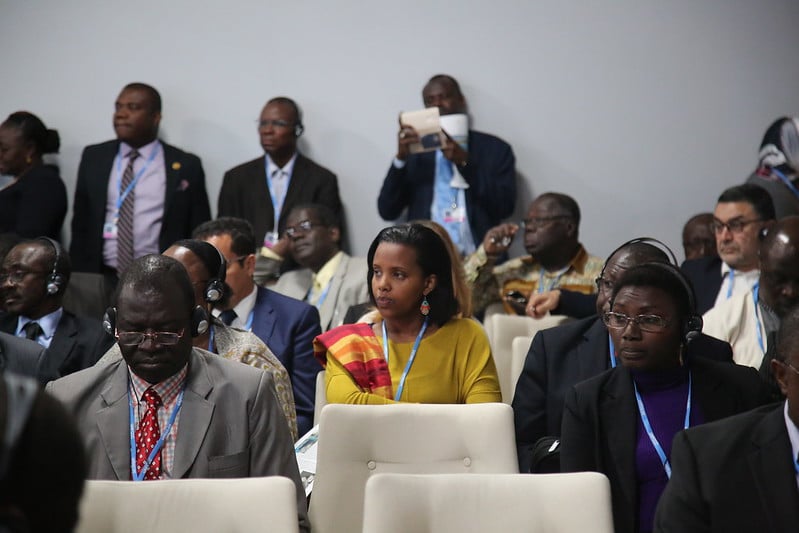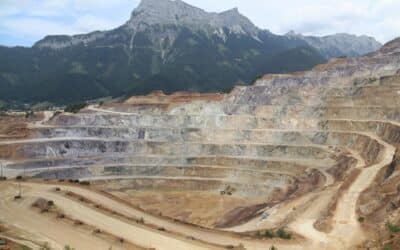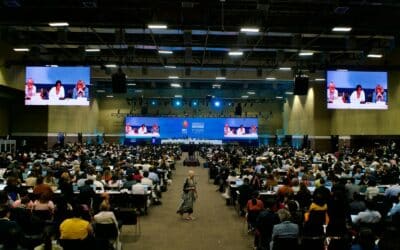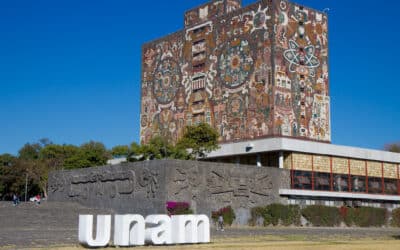Photo Credit: Ministry of Environment – Rwanda
By Dr. Mfoniso Antia (Health of Mother Earth Foundation/Africa Technology Assessment Platform) and Seryna Solanki (Outgoing Coordinator, Hands Off Mother Earth Alliance)
Earlier in August, at its 19th Ordinary Session, the African Committee of Environmental Ministers (AMCEN) agreed its outline position ahead of COP28. AMCEN addressed the issue of solar radiation management (SRM) by calling for a global governance mechanism for non-use; whilst cautioning against the promotion of carbon dioxide removal (CDR) in light of a limited understanding of the risks.
All hope is not lost on the call for precautionary measures to protect Africa against hasty technological “fixes” for climate change in Africa. We’ve just seen a glimpse of light from the advance copy of the decision from the 19th session of AMCEN which held in Addis Ababa, Ethiopia. While it isn’t yet a unanimous African position, with some country presidents like President Ruto having a different position, it is important to highlight and commend the outcome of the draft decision especially Decision 13- ‘To urge developed-country parties and other parties to take ambitious mitigation actions towards achieving the temperature goal of the Paris Agreement and to caution against the promotion of carbon removal technologies in lieu of mitigation efforts, considering the limited information and understanding of the risks associated with such technologies’.
Worthy of a note, is the second part of that paragraph which clearly calls for caution against the promotion of CDR technologies stating insufficiency of information and lack of understanding of associated risks. It is important also to note that the UN Convention on Biological Diversity (CBD) in its 10th meeting (decision X/33) had previously called for precautionary measures on all geoengineering technologies.
Decision 13 of the AMCEN’s advance draft notwithstanding, it is important to raise concern regarding decision 14 which seems somewhat contradictory as it states ‘To call for a global governance mechanism on the risk mitigation and use of technological solutions for emission removals and to urge the consideration of the varying technological advancement between countries during the development and deployment of such technologies’…the call for the consideration of varying technological advancement and the use of technological solutions for emissions removals could simply be perceived as a disguised way of welcoming geoengineering solutions (E.g CDR) which paragraph 13 cautioned against.
Amidst the convoluted language, there is another major development that should shape geoengineering governance discussions – decision 15 – ‘To express concerns with the promotion of technologies, particularly solar radiation management and to call for a global governance mechanism for non-use of solar radiation management’. The call for a non-use governance mechanism of solar geoengineering by Africa should be noted by international bodies amongst the infiltration of vocal geoengineering advocates within these bodies that appropriate claims that Africa wants solar geoengineering. Western opinion-formers have tried to persuade Africans that solar geoengineering projects may be in the Continent’s best interest, this obviously being linked to (mostly Western) corporations’ efforts to persuade Africans into accepting corporate capture and control.
Earlier this year, the campaign group ‘Don’t Geoengineer Africa’ of 35+ African Civil Society Organizations sent a letter to AMCEN, expressing deep concerns about the recent proposals to advance geoengineering technologies in Africa. The letter encouraged AMCEN, and thus African governments, to engage with initiatives that call for the ‘non-use’ of geoengineering and base their assessments on an accurate scale of environmental, political, and social risks and harms. In the past, AMCEN has noted that discussions of such technologies cause ‘developed countries to shy away from their UNFCCC obligations’ and will ‘further divert political will and resources away from obligations’.
This piece is therefore calling on African Ministers to take another look at the draft decision to reconcile the contradictions while emphasizing the importance of the commendable call for precaution in decision 13 and non-use agreement in decision 15.
Africa should not be fooled or allowed to venture into another cycle of colonialism disguised in this wave of carbon markets and credits. African ministers should lead the call for African Governments to take a cautious step back to reevaluate their approach to climate change mitigation and adaptation.
The next steps for AMCEN should be to work with similar-minded countries and advance a Solar Geoengineering Non-Use Agreement. In addition to this, we expect AMCEN to engage with the experiences and analysis by civil society that would contribute to AMCEN’s understanding of the true scale of unavoidable risks and harms to communities and ecosystems that geoengineering would pose. Geoengineering technologies are against the interest of Africa’s sustainable development and a just transition – Africa can and should have a stronger demonstration of precaution and restrictions on these technologies, and lead by example.



